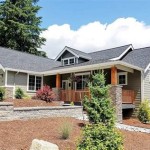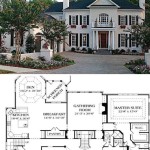Spanish Colonial Style House Plans
Spanish Colonial architecture is a style of architecture that was developed in the Americas during the colonial period of the Spanish Empire. It is characterized by its thick walls, whitewashed exteriors, and heavy timber beams. Spanish Colonial style house plans are a popular choice for those who want to build a home with a rich and historic character.
History of Spanish Colonial Architecture
The Spanish began to colonize the Americas in the 16th century. They brought with them their own architectural styles, which were heavily influenced by the Renaissance and Baroque periods in Europe. The Spanish Colonial style of architecture developed as a result of the interaction between these European styles and the local traditions of the Americas.
Spanish Colonial architecture flourished in the Americas for over two centuries. It was used to build churches, missions, government buildings, and private homes. The style is particularly associated with the southwestern United States, Mexico, and Central and South America.
Characteristics of Spanish Colonial Style House Plans
Spanish Colonial style house plans are typically characterized by the following features:
- One or more patios
- A red tile roof
- Whitewashed or stucco exterior walls
- Heavy timber beams
- Arched doorways and windows
- A courtyard
These features are designed to create a home that is both comfortable and stylish. The patios and courtyards provide outdoor living space, while the whitewashed walls and red tile roof reflect the heat of the sun.
Advantages of Spanish Colonial Style House Plans
There are many advantages to building a home with a Spanish Colonial style house plan. These advantages include:
- Beauty: Spanish Colonial style homes are known for their beauty and elegance.
- Durability: The thick walls and heavy timber beams of Spanish Colonial homes make them very durable.
- Energy efficiency: The whitewashed walls and red tile roof of Spanish Colonial homes reflect the heat of the sun, making them energy efficient.
- Affordability: Spanish Colonial style homes can be built for a relatively affordable price.
Disadvantages of Spanish Colonial Style House Plans
There are also some disadvantages to building a home with a Spanish Colonial style house plan. These disadvantages include:
- Maintenance: Spanish Colonial homes require more maintenance than other types of homes.
- Resale value: Spanish Colonial style homes may not have as high of a resale value as other types of homes.
- Climate: Spanish Colonial style homes are best suited for warm climates.
Conclusion
Spanish Colonial style house plans are a popular choice for those who want to build a home with a rich and historic character. These homes are known for their beauty, durability, and energy efficiency. However, it is important to be aware of the disadvantages of Spanish Colonial style homes before making a decision about whether or not to build one.

Small Spanish Contemporary House Plan 61custom Modern Plans Style Homes

1928 Home Builders Catalog Spanish Style Homes Vintage House Plans Modern

Spanish Colonial Home Plans Sater Design Collection

Villoresi Small Luxury House Plan Courtyard

Spanish Revival Style Home 1926 Universal Plan Service No 543 House Plans Portland Homes

Spanish Style Plans 1900 To1935 Vintage House

Spanish Colonial Home Plans Sater Design Collection

American Residential Architecture The El Pardo House Plans 1929 Home Builders Catalog Spanish Colonial Revival Monterey Style

Spanish Colonial With Central Courtyard 82009ka Architectural Designs House Plans

The Oklahoman S House Plan For June 17 2024 Santa Fe








